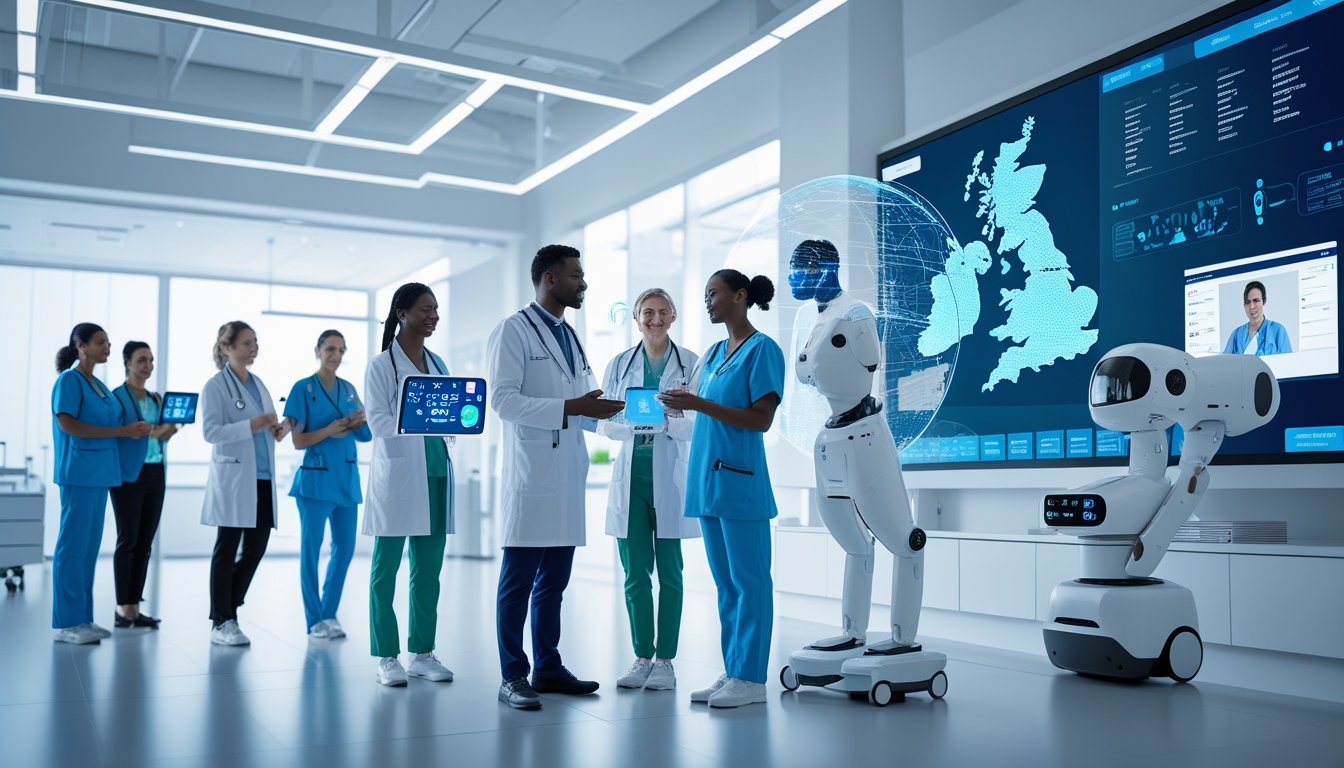Late updated: 30 Aug 2025 10:08
Written by: Oliver Bennett
AI Solutions for Remote UK Healthcare Access: Transforming Patient Connectivity
Artificial intelligence is revolutionising how we deliver remote healthcare access across the UK. With the demands on the NHS climbing steadily, AI provides innovative solutions to improve efficiency and enhance patient outcomes. One of the most promising advancements is how AI technologies can support accessibility for patients residing in remote or underserved regions. This innovation ensures vital healthcare services are available to everyone, regardless of location.

Telemedicine powered by AI has transformed how we engage with healthcare systems. From diagnostics and treatment plans to real-time health monitoring, AI solutions are making virtual healthcare platforms more effective and personalised. These advancements not only help alleviate the burden on our healthcare system but also allow patients to receive quality medical attention promptly.
The integration of AI into remote healthcare services promises a future where access to medical care is fair, timely, and inclusive. By harnessing the power of advanced technologies in telemedicine, we can optimise resources and tackle geographical barriers, thus enhancing the reach and quality of healthcare across the UK.
Key Takeaways
- AI is enhancing remote healthcare access in the UK.
- Telemedicine benefits from AI-driven innovations.
- Accessibility and service quality are improving with AI.
AI Solutions Enabling Remote Healthcare Access in the UK
AI is revolutionising healthcare across the UK by enhancing virtual triage, remote monitoring, and the delivery of care in underserved areas. Each advancement aims to improve accessibility, efficiency, and personalisation in healthcare services.
AI-Driven Virtual Triage and Appointment Booking
AI-driven virtual triage systems are transforming how patients interact with healthcare services. These systems use algorithms to assess symptoms and determine the urgency of care required, thereby optimising patient flow in NHS facilities. This technology allows us to prioritise appointments based on medical necessity, reducing wait times and improving patient satisfaction. Natural Language Processing (NLP) aids in interpreting patient queries, while machine learning models continuously learn from new data, refining their accuracy and reliability. The integration of AI with appointment booking systems ensures seamless scheduling, thus streamlining healthcare processes.
Remote Patient Monitoring and Virtual Wards
Remote patient monitoring has gained traction with AI's help. NHS Virtual Wards utilise AI-powered devices to keep tabs on patients' real-time health metrics. This setup not only reduces hospital readmissions but also enhances proactive care. Data is sent directly to healthcare professionals, enabling them to intervene when necessary. Machine learning algorithms predict potential health issues by analysing trends and anomalies in the gathered data, allowing for timely interventions. By leveraging AI, we make remote care a feasible and effective option, particularly beneficial for managing chronic conditions that require continual oversight.
Enhancing Healthcare Delivery in Underserved Areas
AI plays a crucial role in addressing healthcare disparities in underserved regions. With NHS's collaboration with private AI firms, solutions have been developed to bring personalised care to areas lacking sufficient medical resources. These partnerships have introduced AI systems capable of delivering diagnostics and treatment recommendations remotely. Improved data infrastructure enables nationwide access to AI-driven healthcare insights. By scaling AI applications, we bring equitable healthcare access to those in remote or economically challenged areas, ensuring their healthcare needs are met without the need for extensive travel.
Cutting-Edge AI Innovations Transforming UK Healthcare

AI technologies are reshaping healthcare in the UK by enhancing diagnostic capabilities, optimising treatment strategies, and improving patient outcomes. In this section, we explore how AI innovations are revolutionising remote healthcare access through predictive analytics and drug discovery.
Role of Predictive Analytics in Remote Care
Predictive analytics is pivotal to remote healthcare, allowing us to anticipate patient needs and allocate resources efficiently. By analysing large datasets, AI can identify patterns that predict potential health issues before they manifest. This proactive approach enables personalised care plans tailored to individual patient profiles.
Patients in remote areas benefit greatly as healthcare providers can deliver timely interventions without the need for physical visits. In turn, this reduces the strain on healthcare facilities and improves access to services. Predictive models also facilitate better management of chronic conditions by forecasting disease progression, ensuring patients receive necessary adjustments in their care plans.
Furthermore, integrating predictive analytics with telemedicine platforms enhances the accuracy of remote diagnostics, providing a more comprehensive understanding of patient health. This synergy offers significant advantages in delivering high-quality remote healthcare.
AI-Powered Drug Discovery and Treatment Optimisation
AI is transforming drug discovery and treatment optimisation by accelerating research and development processes. By leveraging machine learning algorithms and data analysis, we can identify potential drug candidates with greater speed and precision. This approach shortens the traditional drug development timeline, bringing effective treatments to patients sooner.
In the UK, AI tools are helping us tailor treatments to individual patients based on genetic profiles and other biomarkers. This personalised medication strategy enhances treatment efficacy and reduces adverse effects. AI also assists healthcare professionals in selecting optimal treatment plans by predicting patient responses using historical data.
Furthermore, AI-driven simulations offer meaningful insights into drug interactions and resistance patterns, ensuring safer and more effective therapeutic options. These advancements are crucial for advancing remote healthcare, providing patients with cutting-edge treatments even in distant locations.
Frequently Asked Questions

Artificial intelligence (AI) is reshaping the landscape of healthcare in remote areas of the UK. This transformation leverages AI for enhanced healthcare delivery, data security, workload reduction, and chronic care management, while addressing unique challenges and accuracy concerns.
How can AI enhance the provision of healthcare services to remote areas in the UK?
AI technologies extend healthcare reach in remote areas by enabling telemedicine, remote monitoring, and virtual consultations. These advancements reduce travel requirements and provide timely access to specialist care, even in isolated locations. Our efforts focus on deploying AI solutions that ensure equitable access to healthcare resources.
What security measures are in place to protect patient data in AI-driven remote healthcare systems?
Safeguarding patient data is paramount. We employ encryption, access controls, and regular audits to ensure data integrity and confidentiality. Our AI systems comply with stringent data protection regulations, such as GDPR, to maintain trust and security in healthcare exchanges.
In what ways can artificial intelligence contribute to reducing the workload of healthcare professionals in rural settings?
AI assists healthcare professionals by automating routine tasks, triaging patients, and providing decision support. This alleviates the burden on healthcare workers in rural settings, allowing them to focus on complex cases and improve patient care efficiency. AI tools act as valuable team members, streamlining clinical workflows.
How does AI-driven remote healthcare support patients with chronic conditions?
We utilise AI to offer personalised care for patients with chronic conditions through remote monitoring and continuous data analysis. This proactive approach aids in early intervention and timely adjustments to treatment plans. AI ensures consistent support, helping patients manage their conditions effectively from home.
What are the challenges of implementing AI solutions in remote UK healthcare, and how can they be overcome?
Implementing AI in remote healthcare faces challenges such as resource limitations, infrastructure deficits, and resistance to technology. By investing in robust infrastructure, providing training, and engaging stakeholders, we can overcome these barriers and ensure successful AI integration in underserved areas.
What level of accuracy can be expected from AI diagnostics in remote healthcare settings?
AI diagnostics in remote settings demonstrate high accuracy, often rivaling or surpassing human performance. Continuous updates and training of AI models ensure that diagnostic tools stay reliable. We remain committed to verifying the accuracy of AI solutions and adapting them to cater to evolving healthcare needs.
